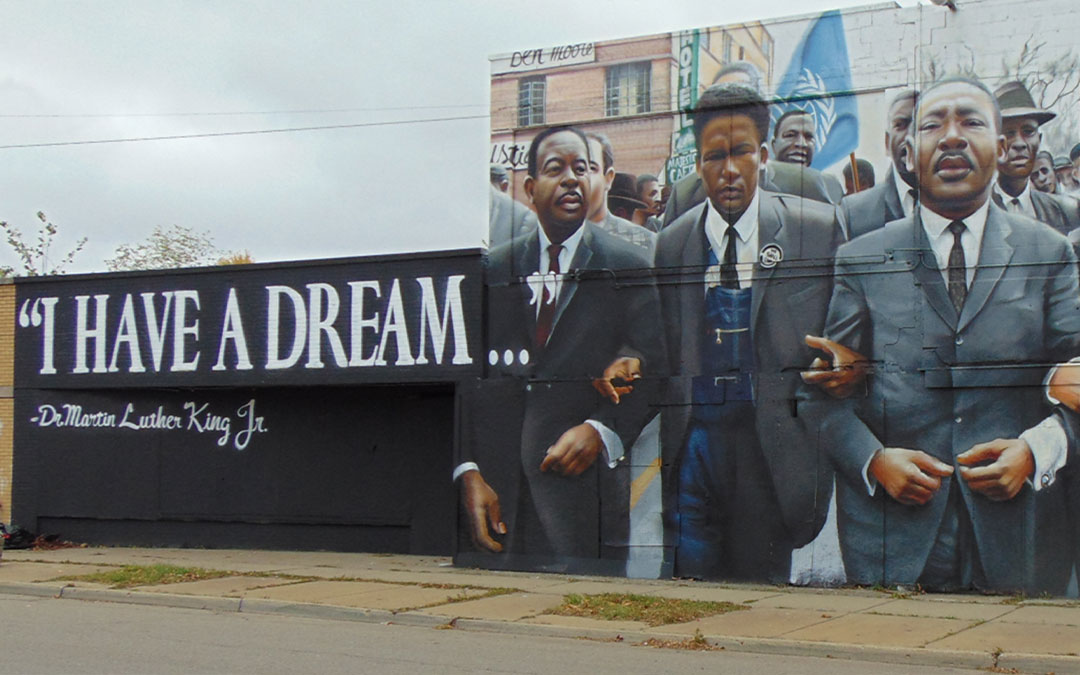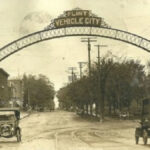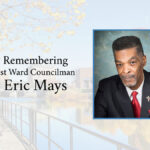Dozens of people have stood and thought, reacted, and often been photographed at this mural in this month.
Artist Kevin Burdick with the Flint Public Art Project prepared a larger-than-life mural based on a photograph taken during the Selma to Montgomery March in 1965. Dr. King, Ralph Abernathy, James Forman, Jesse Douglas, and John Lewis pictured arm in arm.
The mural is two stories tall and fills the east wall of the old Gil-Roy’s Hardware store on King Avenue at W. Dewey Street. The powerful reactions are not only because it is a strong mural but perhaps because it is speaking to each of us.
It probably speaks to us in quite different ways. Perhaps a memory, a wish, a fear, a dream, perhaps even a commitment of lifting up Flint and the United States to a place that is strong and always inclusive.
As I watch and “feel” these powerful moments among the many who stop and look, touch, or ask for their picture in front of this powerful mural, I want to know more, but I hesitate to intrude.
I went looking for what others have said about coming to that day, that march to share with you. The Atlantic Magazine’s 2018 archive has an interview with John Lewis, the recently deceased Georgia Congressman, on what it was like to get to know and be known by Dr. King and to grow in skills and confidence to speak and act.
What follows is a bit of the time and the impact of Dr. King as John Lewis told his own story.
John Lewis describes being a 15-year-old in 1955 and hearing of Dr. King and Rosa Parks,” they inspired me to get into trouble. In 1957, I wrote Dr. King a letter and told him that I wanted to attend a little (whites-only) college 10 miles from my home and that I applied and never heard a word and went off to a small college in Nashville.”
Two years later Dr. King heard that I was in Nashville and told me to come see him in Montgomery. A young lawyer met me at the Greyhound bus station and drove me to the First Baptist Church and ushered me into the office.
I saw Dr. King and Reverend Abernathy standing behind a desk and was so scared that I didn’t know what to do. Dr. King said ‘Are you the boy from Troy? Are you John Lewis? ‘And I said, ‘I am John Robert Lewis.’ I gave him my whole name and he still called me ‘the boy from Troy!’ He told me to go back home and have a discussion with my mother and my father. He said they could lose their land. Their home could be burned or bombed and they must know that. But if I got the okay from them, we would file a suit against Troy State and against the state of Alabama, and I would get admitted to the school.
I had a discussion with my mother and my father, and they were terribly afraid, so I continued to study in Nashville.
And time passed… It was in Nashville that I got involved in the sit-ins and the Freedom Rides. In ’61 we were beaten and left bloody and unconscious at the Greyhound bus station in Montgomery. I saw King so many times afterword. He inspired me and when you would listen to him, you were ready to go out there and put your life on the line. It was the right thing to do.”
In 1963, we marched with Dr. King at the March in Washington, D. C. and I was to speak and many of the other leaders were concerned about what I planned to say (I was too young), and Dr. King listened to my speech and said ‘John, that doesn’t sound like you. Can you change that?’… I couldn’t say ‘no,’ but my speech still came out okay.”*
In 2019, John Lewis said “There’s still a need to speak up – speak out.”
King Avenue PLUS members and neighbors and strangers talk and remember “John Lewis was always prepared – before we had many kinds of backpacks, he was always prepared to go to jail – sandwiches, apple, toothbrush in his pocket” “I had to introduce Dr. King once and was too scared and couldn’t say Southern Christian Leadership Conference and this leader said, “I can say that, let me do it.”
Dr. King prepared… and in the quiet on Flint’s King Avenue, perhaps our thoughts include people’s thoughts.
“Will I walk… and keep on walking?” “Will my actions hurt my family?” “Can I trust?” “Am I trustworthy?” “Will I listen?” “Will I hear?” “Will I respect ALL?” “Am I prepared to care for another and our community?”
“Am I willing to walk in the footsteps of those heroes who walked before me and make them proud of my words and actions?”
I wonder… and I have hope for all of us as neighbors in Flint.
*Source: The Atlantic Monthly Magazine / archive/2018/02/john-lewis-martin-Luther-king-Jr How Martin Luther King Jr. recruited John Lewis





